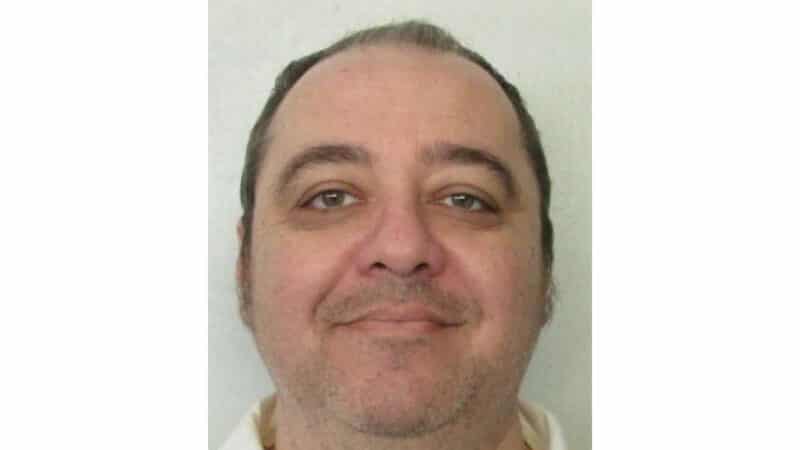Judge weighs request to stop nation’s first execution by nitrogen, in Alabama
MONTGOMERY, Ala. (AP) — A federal judge heard diverging arguments Wednesday about the humaneness and risks of execution by nitrogen gas as he weighs whether to let Alabama attempt the nation’s first use of the method.
Attorneys for Kenneth Eugene Smith are asking a judge to block his Jan. 25 execution by nitrogen hypoxia. They argued that the method violates the constitutional ban on cruel and unusual punishment and said the mask, which is fitted seal over his nose and mouth, would interfere with his ability to pray with his spiritual adviser.
Robert Grass, an attorney for Smith, told the judge the execution method “exposes Mr. Smith to the risk of superadded pain” which is not allowed under the U.S. Constitution.
The state attorney general’s office urged U.S. District Judge R. Austin Huffaker Jr. to reject the request, saying the method is humane. Huffaker did not indicate when he will rule.
The execution method would use the mask to replace breathable air with nitrogen, causing death from lack of oxygen. Nitrogen makes up 78% of the air that humans inhale and is harmless when mixed with proper oxygen levels. The nitrogen would be administered for at least 15 minutes or “five minutes following a flatline indication on the EKG, whichever is longer,” according to the state’s execution protocol.
Anesthesiologists, state officials, Smith and others testified during Wednesday’s daylong hearing, with much of it focused on the risk of vomiting, what Smith might experience and what would happen if he were not to receive pure nitrogen because of a faulty mask fitting.
Dr. Robert Jason Yong, an assistant professor of anesthesiology Harvard Medical School who testified on behalf of Smith’s case, said low oxygen can result in nausea and vomiting, creating a risk of choking on aspirated vomit. He also said that if a person is exposed to less than 100% nitrogen, there is a risk they could experience the sensation of suffocation or be left in a vegetative state instead of dying.
The Alabama attorney general’s office called those risks speculative and asked Yong how long a person could live breathing 99% nitrogen and to provide examples where a person was left in a vegetative state from nitrogen exposure. Yong replied that there is limited information about nitrogen hypoxia in humans, with most of what is known coming from industrial accidents and suicides using nitrogen or another inert gas.
Richard D. Anderson of the attorney general’s office argued that the constitutional ban on cruel and unusual punishment is not a guarantee against any pain and Smith can not show a risk of substantial pain.
After the testimony, Huffaker, noting that there had been considerable testimony about the risk of vomiting, asked the state to provide information about when an inmate would last eat before going into the execution chamber.
The judge also asked the state about Smith’s concerns that the mask would interfere with his ability to pray. Smith’s attorneys said in their court filing that he must “either abstain from his religious exercise of audible prayer to avoid dislodging the mask or audibly pray and risk the dire consequences of breaking the mask’s seal.”
Anderson responded that Smith can pray without the mask before execution witnesses arrive but it must be fitted before witnesses are brought into the prison. He said corrections officers strap Smith to the gurney, fit the mask and then leave the chamber to escort execution witnesses inside.
Huffaker said that is something that the state might want to think about. He did not elaborate.
Smith is one of two men convicted in the 1988 murder-for-hire slaying of Elizabeth Sennett in northwestern Alabama. The Alabama Department of Corrections tried to execute him by lethal injection last year but called it off when authorities could not connect the required two intravenous lines to him.
Smith’s attorneys also argued that Alabama proposed to execute him by nitrogen to end litigation and requirements to turn over information about what went wrong at the failed 2022 lethal injection.
Smith, shackled and wearing a blue polo shirt and pants, testified briefly that that he has already been put in an isolation area ahead of his scheduled execution next month.
Alabama coal mine keeps digging after hundreds of fines and a fatal explosion
Following the death of a grandfather, Crimson Oak Grove Resources has left a community afraid for their homes and lives. An expert warns one resident may need to evacuate her home while she still can.
Florida’s 6-week abortion ban will have a ‘snowball effect’ on residents across the South
Abortion rights advocates say the ban will likely force many to travel farther for abortion care and endure pregnancy and childbirth against their will.
Attitudes among Alabama lawmakers softening on Medicaid expansion
Alabama is one of ten states which has not expanded Medicaid. Republican leaders have pushed back against the idea for years.
Birmingham is 3rd worst in the Southeast for ozone pollution, new report says
The American Lung Association's "State of the Air" report shows some metro areas in the Gulf States continue to have poor air quality.
Why haven’t Kansas and Alabama — among other holdouts — expanded access to Medicaid?
Only 10 states have not joined the federal program that expands Medicaid to people who are still in the "coverage gap" for health care
Once praised, settlement to help sickened BP oil spill workers leaves most with nearly nothing
Thousands of ordinary people who helped clean up after the 2010 BP oil spill in the Gulf of Mexico say they got sick. A court settlement was supposed to help compensate them, but it hasn’t turned out as expected.








